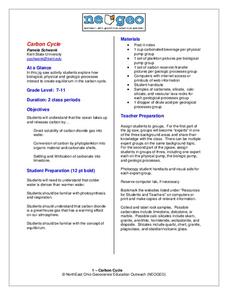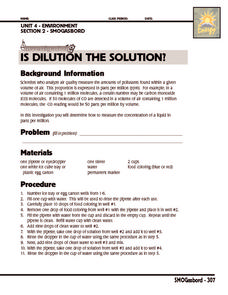National Wildlife Federation
What's Your Habitat?
How are third graders like rabbits? They both live in habitats and require food, water, and shelter to survive! An educational science instructional activity encourages your learners to think about their own habitats and survival needs,...
NOAA
Where Have All the Glaciers Gone?
What happens when ice melts? Well ... water happens. When that melting ice is a glacier, the amount of water that results produces change throughout the world. Middle school science sleuths uncover the truth about global warming, the...
Teach Engineering
Density Column Lab - Part 2
Groups suspend objects within layers of liquids to determine the densities of different liquids and compare them to the densities of objects calculated in Part 1. The groups then carefully test their calculations by layering the liquids...
Teach Engineering
Chromatography Lab
Groups use alcohol and chromatography paper to separate the color components of black ink. The purpose of the activity is to allow the class to become aware that mixtures exist in hidden places.
PBS
Talking to Myself: Hamlet’s Soliloquies
If you’re a first time teacher of Hamlet—or any Shakespeare play, this resource will help keep your head above water. Included are copies of Hamlet’s soliloquies, worksheets for student work, and high-quality videos that demonstrate to...
Calvin Crest Outdoor School
Survival
Equip young campers with important survival knowledge with a set of engaging lessons. Teammates work together to complete three outdoor activities, which include building a shelter, starting a campfire, and finding directions in the...
Texas State Energy Conservation Office
Investigation: Conservation of Energy
By rolling marbles down a six-foot length of track, physical scientists determine how much energy is lost to heat. It is recommended that you opt for the foam pipe insulation track because more friction slows the marble, allowing...
Consortium for Ocean Science Exploration and Engagement (COSEE)
Carbon Dioxide & Krill: Impacts
What effects do temperature and carbon dioxide levels have on the zooplankton of Antarctica? This concluding lesson plan in a short unit on climate change and the ocean helps environmental scientists answer these questions. After...
American Chemical Society
Production of a Gas - Controlling a Chemical Reaction
Though the publisher designated this unit for use with third through eighth grades, this particular lesson would be best used with middle schoolers due to the specific measurement skills required. Basically, they set up the reaction...
Cornell University
Shedding a "Little" Light on Cancer Surgery
Many types of cancer treatments now depend on nanotechnology—a big "little" discovery. Scholars begin by removing "malignant" tissue from simulated brains, one using fluorescent markers thanks to nanotechnology and one without. This...
Roald Dahl
The Giraffe and the Pelly and Me
Follow up a reading of The Giraffe and the Pelly and Me by Roald Dahl with this collaborative lesson on teamwork. Starting with a fun team game, learners go on to investigate examples of teamwork in the story before working in small...
Institute of Electrical and Electronics Engineers
Waterproof that Roof!
Stop the raindrops from getting into the house! Eager engineers learn about roofing history and waterproofing by nanotechnology. They get into groups and work on designing a waterproof roof for a small model house. The accompanying...
Virginia Department of Education
Aspirin Analysis
Laughter may be the best medicine, but aspirin is also important. Young chemists analyze aspirin tablets using titration in this lab experiment. They then repeat the entire experiment using a different aspirin brand.
Texas State Energy Conservation Office
Investigation: Kinetic and Potential Energy
A well-developed lab sheet guides physical science learners through an investigation of kinetic and potential energy. In small groups, collaborators discover whether or not the ramp height or mass of an object has an effect on the...
American Chemical Society
Investigating the Line
Note that this activity is best paired with the preceding activity in the unit. In that activity, elementary physical scientists observed that the color coating of M&Ms® candies do not mix when dissolved off of the chocolate surface....
Curated OER
Turning the Tide on Trash: Marine Debris Curriculum
Six different lessons comprise this unit on marine debris. Science, language arts, social studies, and art projects make this an ideal interdisciplinary unit. The result will be well-informed future citizens who can help make a...
NorthEast Ohio Geoscience Education Outreach
Carbon Cycle
Using a jigsaw approach, earth science experts teach each other about the physical, biological, and geologic components of the carbon cycle, with a specific focus on the ocean.
Kenan Fellows
Determining Stream Health by the Diversity and Types of Benthic Organisms
How diverse are the benthic organisms found in local streams? Using the information learned in previous lessons on identification of macroinvertebrates and on calculating stream index values, groups determine the health of local streams....
Curated OER
Debating Controversial Issues: Integrating Science and Current Events
In order to give young scientists experience with critical thinking skills, introduce them to a current controversy and prepare them to debate. Choose a topic, such as genetically modified organisms, and assign groups to represent...
KOG Ranger Program
The Value of Oregon’s Forests
No matter where you go, you're in the middle of a forest in some way. Use a lesson about forests and the many ways they contribute to our world, including the ecosystems of animals and plants living in their shady soil.
Orange County Water Atlas
Location, Location, Location…
Young geographers discover not only how to read and recognize coordinates on a map, but also gain a deeper understanding of latitude and longitude and how climate changes can vary significantly across latitudes.
Curated OER
Wetland vs. Stream Macroinvertebrates
A link to a comprehensive macroinvertebrate guide gives you the information needed to prepare for this field study activity. Sample macroinvertebrates are collected from areas representing different environmental conditions. Junior...
Texas State Energy Conservation Office
Investigation: Is Dilution the Solution?
Systematically diluting a full-strength sample of food coloring is meant to help earth scientists understand concentration in parts per million. While they will enjoy the lab exercise, it might be a challenge to help them relate it to...
Curated OER
The Chesapeake Bay in Captain John Smith's Time
When Captain John Smith visited the Chesapeake Bay in the summer of 1608, what types of animals and habitats did he encounter? Your young historians will analyze primary source documents to answer this question, as well as compare the...

























